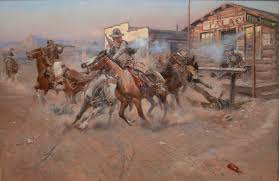Enter now to win a copy of the award winning book
Sam Sixkiller: Cherokee Frontier Lawman

A hot sun beat down on the busy residents of Muskogee, Oklahoma, in June 1880. A heavy veil of humidity, like a stifling blanket hung over the town as well.1 The primitive railroad stop was slowly coming into its own. More than five hundred people called the area home, among them were employees of the Missouri-Pacific Railroad. The workers gathered by the score and milled about the hamlet of lean-tos, tents and cabins. Gamblers had pitched their canvas dwellings in prime spots, and crowds flocked around their tables. Quarrels flared up between slick poker dealers and inexperienced card players. Soiled doves prowled around the gaming tents and curious male bystanders like panthers. They enticed men looking for a fight to their crude dens then stripped them of any funds they had not lost in a crooked card game. Unsuspecting shoppers and their families roamed in and out of the heated arguments that made it into the street. They gawked warily at the chaos while on their way to and from various stores.2
City officials watched the scene play out in disgust. Bootleg alcohol was usually sold to the railroad crews and the houses of ill repute, and the clientele had a hard time controlling the amount they consumed. More often than not customers who frequented bawdy houses and who drank to excess were prone to violence.3 They terrorized the neighborhood surrounding the brothels, recklessly firing their guns at women and children and brawling with townsmen who challenged them to put away their weapons.4
In spite of repeat warnings from law enforcement officers like Colonel J.Q. Tuffts, a United States Agent for the Union Indian Agency in Muskogee, to the madams who ran the brothels to shut their businesses down voluntarily, no efforts had been made by them. Brothels were considered a necessary evil; a portion of the income spent at such houses supported public services such as the police department.5 Agent Tuffts didn’t care about that. He considered the bordellos a hangout for criminals and delinquents from all over the area. When Agent Tuffts made Sheriff Sixkiller captain of the Indian police in early February 1880, he made ridding Muskogee of such houses a priority for Sam’s administration.6 Anxious to prove himself in Muskogee since leaving office under a cloud of turmoil in Tahlequah, Sixkiller was eager to accept the job and the challenge.7
Captain Sixkiller and seven deputies, representing the full force of the police force, marched through the streets of Muskogee to a house in the red light district occupied by the most sought after working women in town. A sign in front of the structure read Hotel de Adams.8 Captain Sixkiller and his men stopped short of the building and studied their next move carefully. A couple of cattle punchers tromped out of the enterprising establishment and headed off in the opposite direction of the lawmen unaware anything out of the ordinary was about to happen. Laughter wafted out through the open windows of the building. Captain Sixkiller motioned for deputies on his left and right to cover the back of the business. When he thought the men had time to get into place he moved up the dusty path to the front door with the other lawmen.9
Use this form to enter to win!
To learn more about the life and times of Sam Sixkiller read
Sam Sixkiller: Cherokee Frontier Lawman

